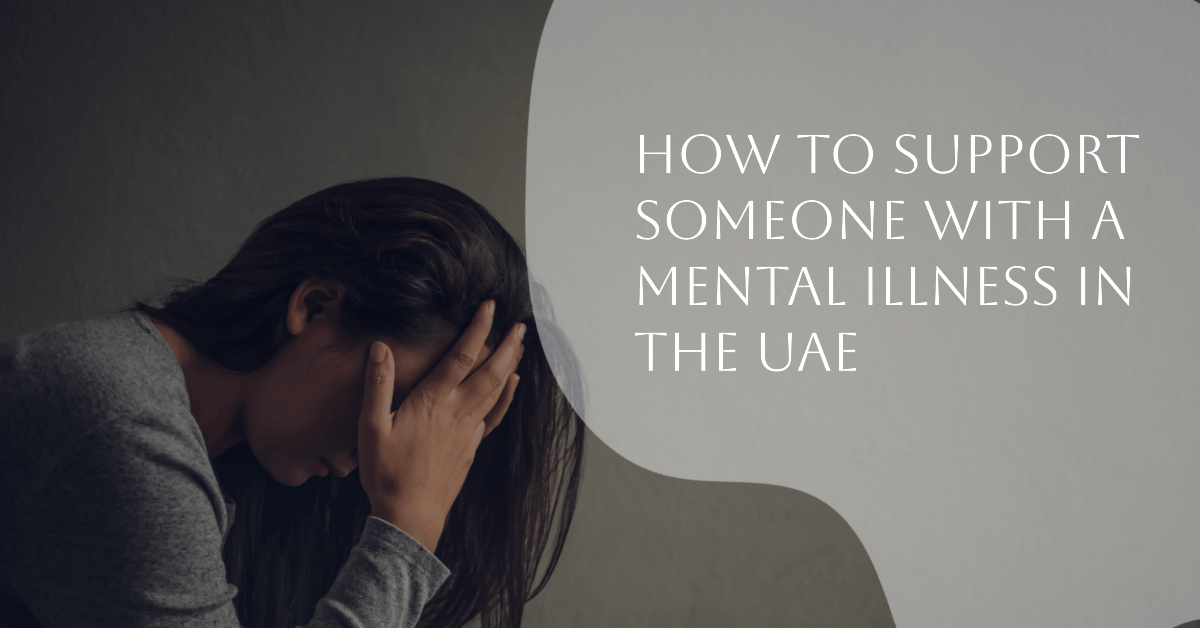Have you ever wondered how to support someone who is going through a tough time with their emotions and thoughts? Well, you’re in the right place! In this blog, we’re going to learn about a very important topic: supporting people with mental illness in the UAE.
Just imagine if you had a friend who felt sad, scared, or confused most of the time. That’s what mental illness can feel like for some people.
In the beautiful United Arab Emirates (that’s what UAE stands for), there are many people who might be struggling with mental illness. It’s important for us to learn how to be kind, understanding, and supportive to our friends, family, or even strangers who may be going through such a tough time.
Throughout this blog, we’ll explore some simple and helpful ways that you can show your support and make a positive difference in someone’s life. Remember, even small acts of kindness can bring great comfort and happiness to others.
Understanding Mental Illness in the UAE

Sometimes, people in the UAE may experience difficulties with their feelings and thoughts. These difficulties are called mental health conditions. Here are a few common ones you might have heard about:
- Depression: It’s like feeling very sad or down most of the time. People with depression may lose interest in things they used to enjoy, feel tired, and have trouble sleeping or eating.
- Anxiety: This is when someone feels very worried or scared a lot of the time, even when there’s no immediate danger. It can make your heart race, make you feel shaky, and give you tummy troubles.
- Stress: Everyone feels stressed sometimes, especially when we have a lot of things going on. But when stress becomes too much, it can affect our mental health. It might make you feel overwhelmed, worried, and even have trouble sleeping.
Remember, these are just a few examples, and there are many other mental health conditions that people might experience. It’s important to understand that having a mental health condition doesn’t mean there’s something wrong with the person.
Cultural Factors Influencing Mental Health Perceptions

In the UAE, like in any other country, there are cultural factors that can affect how we think about mental health. Our culture includes things like our traditions, beliefs, and values. Sometimes, these factors can make it hard for people to talk about mental health or seek help.
In some cultures, people might believe that mental health problems are not real or that they’re a sign of weakness. This can make it difficult for someone to ask for support or talk about their feelings. But it’s important to remember that mental health is just as important as physical health, and it’s okay to ask for help when we need it.
Stigma and Misconceptions Surrounding Mental Illness

Stigma means treating someone unfairly because they have a mental health condition. Unfortunately, there can be a lot of stigma around mental illness in the UAE and around the world. This can make it even harder for people to reach out and get the help they need.
Sometimes, people might have misconceptions about mental illness. They might think that people with mental health conditions are dangerous or that they can just “snap out of it.” But these ideas are not true. Mental illness is not something that people can control on their own, and it’s important to show kindness and understanding to those who are going through a tough time.
Recognizing the Signs and Symptoms

When someone we know is going through a tough time with their mental health, we can help them by providing emotional support. This means being there for them, listening to their feelings, and showing them that we care.
Let’s learn some ways we can offer support to our friends or family members:
Creating a Safe and Non-Judgmental Environment
It’s important to make the person feel safe and comfortable when they talk about their feelings. We can do this by being kind, understanding, and not judging them. We should let them know that it’s okay to feel the way they do and that we are there to support them.
Active Listening and Empathy
Active listening means giving our full attention when someone is talking to us. We can show we are listening by maintaining eye contact, nodding our heads, and not interrupting them. It’s also important to try to understand how they are feeling and to show empathy. Empathy means imagining what it’s like to be in their shoes and letting them know we understand and care.
Encouraging Open Communication
Sometimes, people might find it hard to express their feelings. We can help by encouraging them to talk about what they’re going through. We can ask open-ended questions like “How are you feeling?” or “What has been bothering you lately?” This lets them know that we are interested in their thoughts and feelings.
Offering Reassurance and Validation
When someone is going through a tough time, they may feel unsure or doubt themselves. We can offer reassurance by telling them that they are not alone and that we believe in them. It’s also important to validate their feelings, which means acknowledging their feelings are real and important.
Remember, we don’t have to be experts to provide emotional support. Being there for someone, listening to them, and showing them kindness can make a big difference. If someone’s mental health doesn’t improve or is in immediate danger, it’s important to seek help from a professional, such as a doctor or counselor. They have the knowledge and skills to provide the right kind of support.
Educating Yourself About Mental Illness

Source
It’s important to understand that people’s minds can sometimes face challenges, just like our bodies can get sick. Mental health conditions are like these challenges. To learn about them, you can read books or articles specifically written for kids, ask a grown-up for help, or even watch videos that explain mental health in a way you can understand.
You might come across names like depression, anxiety, or ADHD. Each condition can affect how someone feels or thinks, but everyone’s experience is unique.
When someone has a mental health condition, there are ways to help them feel better. It’s like going to the doctor when you have a physical illness. Treatment options can include talking to a therapist, who is someone trained to help with mental health. Sometimes, people might take medicine prescribed by a doctor to help their minds feel better. Other times, activities like exercising, drawing, or playing can also be part of the treatment. It all depends on what works best for the person and their doctor’s recommendations.
If you or someone you know needs support for mental health, it’s good to know about the resources available in your community. Resources can be places like mental health clinics, hospitals, or helplines. They can provide you with phone numbers or websites where you can reach out for help or get more information.
Encouraging Professional Help

Talking to someone who knows a lot about our feelings is helpful. They are called mental health professionals. They can listen and understand what we’re going through and know how to help us feel better.
Sometimes, we might worry about asking for help. We might think people will judge us or that something is wrong with us. But it’s important to remember that asking for help is a brave and smart thing to do. Everyone needs help sometimes, and it’s okay to ask for it when needed.
Offering Practical Support
Sometimes, when someone feels down or overwhelmed, they might find it hard to do everyday tasks like cleaning up, doing homework, or getting ready for bed. We can be a great help by offering to assist them with these tasks. We can offer to tidy up their room together or help them organize their schoolwork.
We can also remind our loved ones to take breaks, eat healthy food, get enough sleep, and do things they enjoy. We can do these things together, like going for a walk or cooking a yummy meal.
Sometimes, people might need to go to appointments at hospitals with their mental health professionals. We can offer to accompany them if they feel nervous or worried. We can hold their hand and be there to support them. It’s like being a cheerleader for them, helping them feel strong and confident!
Nurturing Self-Care and Well-Being

Encouraging healthy lifestyle choices:
- Eating nutritious foods like fruits, vegetables, and whole grains
- Drinking plenty of water every day
- Getting regular exercise and playing outside
- Limiting sugary snacks and drinks
Promoting stress management techniques:
- Taking deep breaths when feeling stressed or anxious
- Practicing relaxation exercises like stretching or yoga
- Listening to calming music or sounds
- Engaging in hobbies or activities that bring joy and relaxation
Offering support for self-care activities:
- Reminding them to take breaks and rest when needed
- Helping them create a bedtime routine for better sleep
- Assisting in personal hygiene tasks like brushing teeth or taking a bath
- Encouraging them to engage in activities they enjoy, such as reading, drawing, or playing games
Conclusion
In conclusion, helping someone with a mental illness in the United Arab Emirates (UAE) means doing a lot of different things to make them feel better. First, we need to teach people about mental health and ensure they understand it’s okay to have a mental illness. We also need to make sure that there are enough doctors and hospitals that can help people with mental illnesses.
It’s important for everyone to be kind and understanding to people with mental illnesses. We should talk to them and listen to what they have to say. It can also be helpful to have support groups where people with mental illnesses can meet and help each other.


